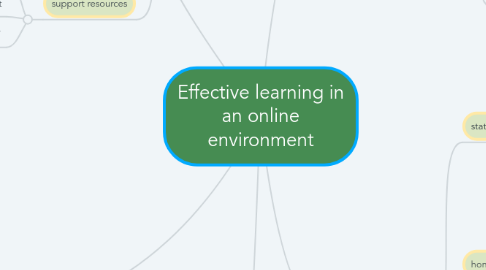
1. subject matter
1.1. useful
1.2. matches the student goals
1.3. level-appropriate
1.4. clear instructions and expectations
1.5. evaluation and assessment
2. teacher
2.1. presence
2.1.1. teaching presence
2.1.1.1. providing quick feedback to students
2.1.2. social presence
2.1.2.1. immediacy
2.1.2.1.1. regular interaction
2.1.2.2. creating positive learning environment
2.2. interested in technology
2.3. up-to-date training
2.3.1. technology
2.3.2. methodology
2.4. support resources
2.4.1. online community
2.4.2. management
2.4.3. IT
3. course design
3.1. have access to a computer and WiFi
3.2. new student orientation
3.3. quick support available
3.4. course is user-friendly
3.4.1. images
3.4.2. videos
3.4.3. level-appropriate
3.4.4. not too much text
3.4.5. interactive activities
3.5. learning theories
3.5.1. How do adult learners construct knowledge?
3.6. online comminuty
4. personality, study habits
4.1. level of formal education
4.2. communication skills
4.2.1. ability to interact with classmates
4.2.2. ability to ask for help
4.2.3. receiving feedback
4.3. time-management skills
4.4. willpower
4.5. culture
4.5.1. time and deadline concept
4.5.2. are some cultures better at studying than others?
4.6. motivation
5. life circumstances
5.1. status in Canada
5.1.1. Permanent Resident
5.1.2. refugeee
5.1.3. citizen
5.2. home, family
5.2.1. young kids?
5.2.2. family support
5.2.2.1. giving time
5.2.2.2. taking on some chores
5.2.2.3. not interrupting
5.2.2.4. supporting in challenging times
5.2.3. having access to a quiet space
5.3. work
5.3.1. hours
5.3.2. type of work
5.3.3. shifts / schedule
5.3.4. using English at work?
